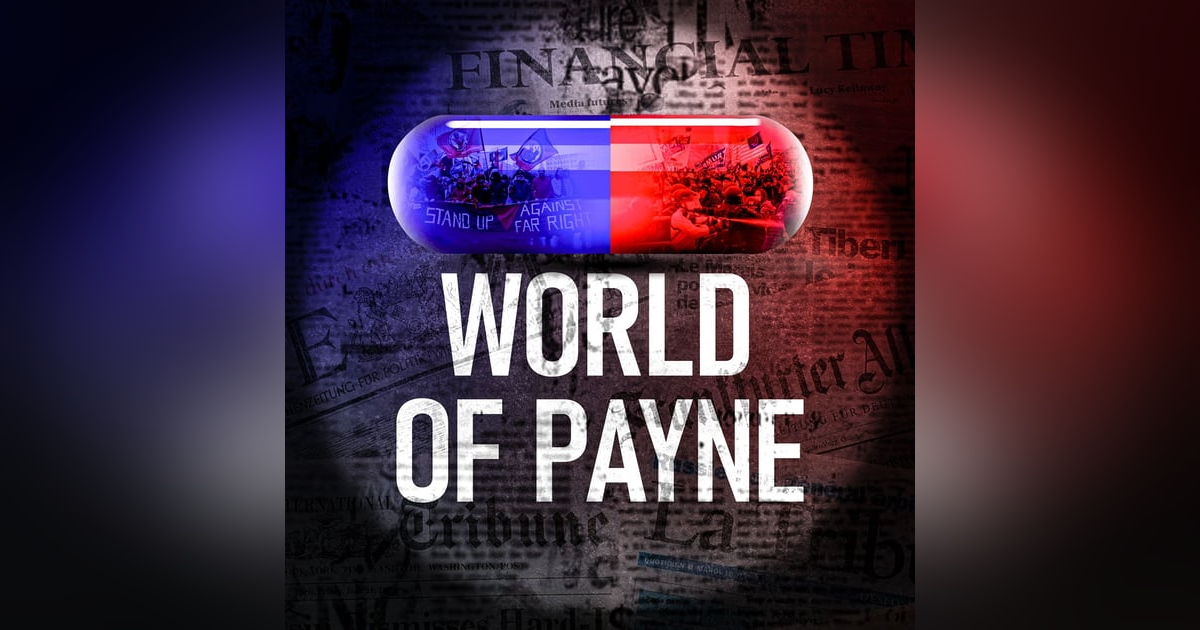America's Government Shutdown: A Crisis of Governance?
Welcome back to the blog, fellow listeners! In this post, we're diving deep into a critical issue that affects every American: government shutdowns. As we've seen time and again, these shutdowns can disrupt essential services and shake the public's confidence in our government. Today, we will explore the underlying causes, the immediate impacts, potential solutions, and how we, as responsible citizens, can contribute to a more stable and effective governance. This discussion is deeply connected to our latest podcast episode, When the Foundations Tremble | World of Payne Podcast. In that episode, we examined a week of global and national instability, including the U.S. government shutdown, and how we can rebuild with strength and accountability. Let's explore the anatomy of a shutdown and the path forward.
Introduction: The Unsettling Reality of Government Shutdowns
The United States government, a beacon of democracy and stability, occasionally finds itself in a state of suspended animation due to government shutdowns. These events, often triggered by budgetary disagreements between the executive and legislative branches, have become a recurring feature of American political life. What was once a rare occurrence has evolved into a more frequent spectacle, raising serious questions about the functionality of our governance system. Government shutdowns are not mere political theater; they have tangible consequences for millions of Americans who rely on government services and the overall economic health of the nation. From national parks shuttered to critical federal agencies operating with skeleton crews, the impact is widespread and far-reaching. It is imperative that we understand the root causes of these shutdowns, assess their effects, and explore viable strategies to prevent them from happening in the future. This requires a commitment to responsible governance, bipartisan cooperation, and a focus on the common good rather than partisan interests.
The Week of Tremors: A Look at Global and National Instability
As discussed in the "When the Foundations Tremble" episode, the recent government shutdown occurred against a backdrop of global and national instability. From the U.S.–Australia rare earths alliance and the Amazon Web Services outage to political scandals, China’s economic slowdown, and other global events, the world feels increasingly precarious. These events collectively contribute to a sense of unease and highlight the fragility of the systems we depend on. The government shutdown, in this context, becomes another example of a system failing to function as intended. It undermines confidence in the American government's ability to manage its affairs effectively, both domestically and internationally. When the government cannot fulfill its basic responsibilities, it weakens the nation's standing on the world stage and creates opportunities for adversaries to exploit. Therefore, addressing the issue of government shutdowns is not just about domestic policy; it is also about maintaining America's leadership role in a complex and uncertain world. We must strive for stability and reliability in our governance to project strength and inspire confidence among our allies and partners.
Understanding the U.S. Government Shutdown
A U.S. government shutdown occurs when Congress fails to pass, and the President fails to sign, appropriation bills funding federal government operations by the start of the federal fiscal year on October 1. This failure leads to a temporary closure of non-essential government agencies, as they lack the legal authority to spend money. The shutdown process involves a complex interplay of political dynamics, budgetary priorities, and legislative procedures. The President submits a budget proposal to Congress, which then crafts appropriation bills to fund various government agencies and programs. These bills must pass both the House of Representatives and the Senate and be signed into law by the President. Disagreements over funding levels, policy riders, or ideological differences can lead to gridlock and, ultimately, a shutdown. There are two general types of government employees. Those that are deemed “essential” and continue working. These essential employees typically include law enforcement officers, air traffic controllers, and those involved in national security. However, they often work without pay during the shutdown, adding financial strain to their personal lives. Other employees are furloughed, meaning they are temporarily laid off without pay. This not only disrupts their livelihoods but also deprives the public of the services they provide. Understanding this process is crucial to identifying the points of leverage where reforms can be implemented to prevent future shutdowns.
The Impact on Essential Services and the American People
The impact of government shutdowns is far-reaching and affects various aspects of American life. Here are some examples:
- National Parks and Museums: During a shutdown, national parks and museums often close, depriving tourists and locals of recreational and educational opportunities.
- Federal Agencies: Agencies like the Environmental Protection Agency (EPA) and the Food and Drug Administration (FDA) may operate with reduced staff, slowing down regulatory processes and inspections.
- Social Security and Medicare: While Social Security and Medicare payments typically continue, administrative functions may be affected, leading to delays in processing claims and inquiries.
- Military and National Security: Although active-duty military personnel continue to serve, civilian employees at the Department of Defense may be furloughed, impacting support services and operations.
- Economic Impact: Government shutdowns can negatively impact the economy by disrupting business activities, reducing consumer confidence, and increasing uncertainty in financial markets.
These impacts are not abstract; they affect real people and communities. Families planning vacations are turned away from national parks. Businesses relying on government permits face delays. Federal employees struggle to make ends meet without paychecks. The cumulative effect is a loss of trust in government and a sense of disillusionment among the American people.
Conservative Principles in Times of Crisis: Responsibility, Integrity, and Faith
From a conservative perspective, government shutdowns represent a failure of responsible governance. Conservative principles emphasize fiscal responsibility, limited government, and adherence to the rule of law. A government shutdown undermines these principles by demonstrating a lack of fiscal discipline and a failure to prioritize essential services. Conservatives also value integrity and accountability in government. Shutdowns often result from a breakdown in negotiations and a lack of willingness to compromise, reflecting a lack of integrity among elected officials. Moreover, conservatives often rely on faith to guide their actions and decisions. In times of crisis, faith can provide strength and hope, but it also calls for responsible stewardship of resources and a commitment to the common good. Applying these principles to the issue of government shutdowns requires a focus on finding practical solutions, promoting responsible budgeting, and restoring trust in government institutions. This may involve difficult choices and compromises, but it is essential for preserving the integrity of our governance system and ensuring the well-being of the American people. As we mentioned in the podcast, now is the time to rebuild!
Exploring Potential Reforms to the Budget Process
To avoid future government shutdowns, it is essential to explore potential reforms to the budget process. Here are some ideas:
- Biennial Budgeting: Switching to a two-year budget cycle could reduce the frequency of budget battles and provide more stability for government agencies.
- Automatic Continuing Resolutions: Implementing a mechanism that automatically extends funding at current levels if Congress fails to pass appropriation bills by the deadline.
- Budget Enforcement Mechanisms: Strengthening budget enforcement mechanisms, such as spending caps and sequestration, to encourage fiscal discipline.
- Bipartisan Budget Commissions: Creating bipartisan commissions to develop comprehensive budget proposals that address long-term fiscal challenges.
- Reforming the Appropriations Process: Streamlining the appropriations process and reducing the number of individual appropriation bills to simplify the budget process.
These reforms are not mutually exclusive; a combination of these measures may be necessary to achieve lasting change. The key is to create a more predictable and sustainable budget process that reduces the risk of government shutdowns and promotes responsible fiscal management.
Strategies for Avoiding Future Government Shutdowns
In addition to reforming the budget process, there are several strategies that policymakers can employ to avoid future government shutdowns:
- Prioritize Essential Services: Ensure that essential services, such as national security, public health, and law enforcement, are fully funded and protected from disruptions during budget negotiations.
- Engage in Good-Faith Negotiations: Encourage elected officials to engage in good-faith negotiations and be willing to compromise to reach a budget agreement.
- Promote Transparency and Accountability: Increase transparency in the budget process and hold elected officials accountable for their decisions.
- Build Consensus: Foster a culture of consensus-building in Congress and encourage bipartisan cooperation on budgetary matters.
- Educate the Public: Educate the public about the importance of responsible budgeting and the consequences of government shutdowns.
These strategies require a shift in mindset and a commitment to putting the interests of the nation ahead of partisan politics. By working together, policymakers can create a more stable and effective governance system that serves the needs of the American people.
Rebuilding with Strength and Accountability: A Call to Action
As listeners of the World of Payne Podcast know, rebuilding requires strength and accountability. Addressing the issue of government shutdowns requires a collective effort from policymakers, citizens, and community leaders. We must hold our elected officials accountable for their actions and demand responsible governance. We must also engage in constructive dialogue and work together to find solutions that benefit all Americans. This starts with being informed, staying engaged, and making our voices heard. Contact your representatives in Congress, participate in town hall meetings, and support organizations that promote responsible governance. By taking action, we can help rebuild our governance system and create a more stable and prosperous future for our nation.
Connect and Engage: Join the World of Payne Community
We encourage you to connect with us on social media and share your thoughts on this important issue. You can find us on X (Twitter) and Facebook. Your voice matters, and we want to hear from you!
Support the Podcast and Our Sponsors
If you enjoy the World of Payne Podcast and this blog, we would greatly appreciate your support. You can become a supporter of the podcast by visiting https://www.spreaker.com/podcast/world-of-payne--4732235/support. We would also like to thank our sponsors, including ValorBuilt Apparel, for their continued support. You can visit their website at http://valorbuilt.us/P2S. Your support helps us continue to bring you informative and thought-provoking content.
In conclusion, government shutdowns represent a serious challenge to our governance system. They disrupt essential services, undermine public trust, and weaken America's standing in the world. However, by understanding the root causes of these shutdowns, exploring potential reforms, and engaging in constructive dialogue, we can work together to create a more stable and effective government. Remember to check out our latest podcast episode, "When the Foundations Tremble | World of Payne Podcast", for more insights on this topic. Thank you for joining us, and we look forward to continuing this conversation with you!



